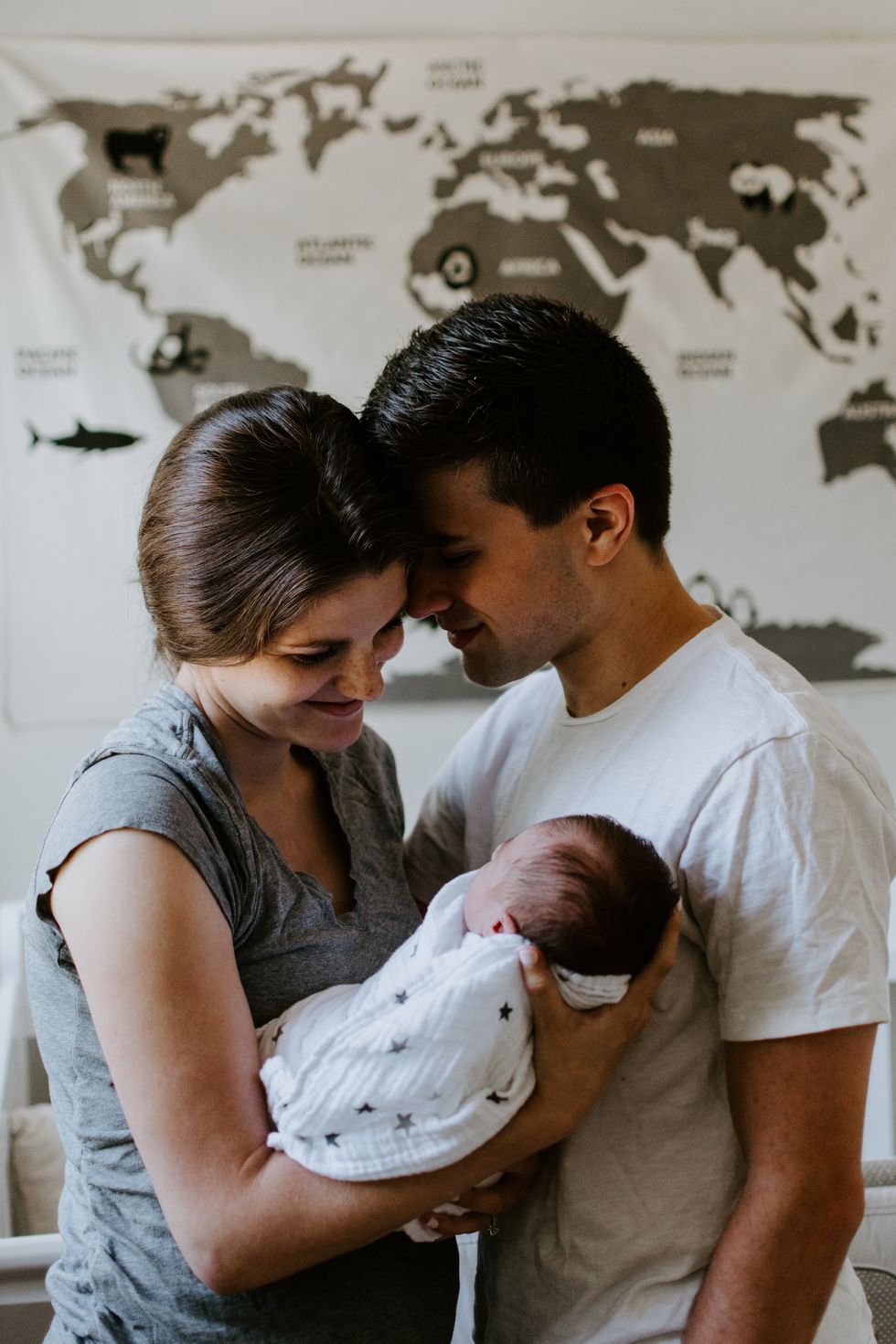Essential Tips, Heartfelt Guidance, And Good Advice For New Parents
Staff Writer, Jasmine Williams, covers a variety of topics from home decor to beauty and everything in between. She has bylines at Motherly, The Everymom, and Byrdie where she wrote about motherhood, beauty, health and relationships. Jasmine knew she wanted to be a writer when she realized she was actually interested in reading the articles in her mom's favorite magazines — and she may or may not have ripped her favorite articles out to study them later. When she's not working, you can find Jasmine playing make-believe with her toddler, spending an undisclosed amount of time in Target or TJ Maxx, and searching for a family-friendly puppy to add to her family.

I'll never forget the moment I looked at my S.O. and said, "When I get through the fog, I want to come up with a new parent checklist to help people navigate the first year of parenthood." This statement came on the heels of dealing with an immune-compromised newborn — now toddler — and a storm of emotions I've dubbed "the fog." It's been a harrowing time of giving myself grace in a society that all but tells moms we're only allowed to express joy about raising children. It feels like sharing our hardships or indicating that we feel any ounce of depression or loneliness makes us "selfish."
Unfortunately, first-time dads aren't exempt from this type of thinking either. The general rule is that parents should know what they're getting into when they decide to have children — except that's not always the case. Truthfully, 41% of parents feel that parenthood is tiring for a number of reasons.
Because I firmly believe parents need helpful guidance instead of judgement, I decided to reach out to Dr. Amber Thornton, a licensed clinical psychologist, Dr. Whitney Casares, a Gerber pediatric consultant, and Brittany Sheehan, founder of Pediatric Sleep Consulting Agency Brittany Sheehan Sleep to help parents get through the first year of parenthood. Here's all the good advice they have for new parents.
The Importance Of Your Mental & Emotional Health

Image via Lina Kivaka/Pexels
In addition to taking care of you and your newborn's physical health, it's important to remember that you're still adjusting to a new role. This idea that you're supposed to immediately bond with your baby or know how to heartily handle motherhood like a pro can be harmful. Take it from one first-time parent to another — this is the time you'll need to give yourself a ton of grace. Thinking you have to be perfect based on society's views or even your own can cause you to spiral when you feel like you've made a mistake.
Dr. Thornton said, "For new moms, it could be helpful to have visual reminders of grace and self-compassion within her environment (i.e., a sticky note with words, or with a quote that inspires these things)." She also believes it's crucial to have a supportive person in your corner so you don't feel "inclined to internalize and provide" grace to yourself.
In terms of caring for you mental and emotional health, Dr. Thornton says there are a few things first-time moms should be aware of. "I think it's really important for moms to first understand that their mental and emotional health matters, and continues to matter, even after becoming a mother," she said. Sadly, parents can forget to take care of themselves because they're trying to make sure everyone else's needs are met. While it's not a bad thing to take care of your newborn and make sure your partner feels appreciated, losing sight of yourself can have adverse effects.

Image via Vlada Karpovich/Pexels
So, how do you take care of your mental and emotional health while learning to care for a newborn? Well, Dr. Thornton said you can do the following:
- Take some time to reflect on and understand what matters when it comes to your mental and emotional health, as well as what your health needs to feel optimal during this time.
- Identify people who you trust and will be able to support you and your mental/emotional health needs. These people should also be people you feel comfortable sharing these needs with and expressing your needs to. Ultimately, you want to identify people who you know will be willing and able to help you when you need.
- Have the conversations around what support for your mental and emotional health needs looks like with your identified people. Continue to have the conversation of expressing your needs as your needs evolve.
How To Set Feeding And Sleep Schedules

Image via Sarah Chai/Pexels
It's exciting to bring home a newborn, but there's still a few things their pediatric care requires. After you and little one are discharged from the hospital, you'll have to take them for their two-day old appointment. This helps their pediatrician not only get to know them better, but your newborn is able to be accessed beyond the standard delivery protocol. This is also a time where your child's pediatrician will go over feeding methods and ask how frequently your newborn is eating.

Image via Anna Shvets/Pexels
Dr. Casares said, "Providing newborns with all the nutrients they need for growth and development is essential. Whether it's breastmilk or formula, parents must aim to feed their baby every 2-3 hours, or whenever the baby shows signs of hunger." She said to you should work with your newborn's pediatrician to figure out the best formula for to offer your little one because they're not all created equal.
Once you've figured out the best method of feeding that will work for your little one, you can begin looking for signs that indicate they're hungry. "...watch out for signs such as rooting, sucking on fingers or fists, and smacking lips," said Dr. Casares.
Monitoring weight gain is another way for parents to find clues if their baby is consuming the proper amount of nutrients. The consensus is babies should gain about 5-7 ounces per week during the first few months of life. To grow and develop properly, newborns need plenty of sleep.

Image via Andrea Piacquadio/Pexels
You and I both know how important sleep is, but I'd be lying if I said I didn't struggle from sleep deprivation during the newborn stage. Sheehan said, "It's very common for babies to only be able to nap in their parents' arms or wake up multiple times a night well past the newborn stage. [But] this doesn't mean it can't be better." That being said, she wants those navigating the first year of parenthood to know one thing about sleep deprivation. "You can't pour from an empty cup. If what you want is to feel better, that will happen when you're able to sleep yourself."
I seemed to think I couldn't possibly sleep when baby sleeps because there was so much to do, but I learned very quickly that it made me feel burned out and highly irritable when I didn't take naps when my son did. Of the idea that parents are supposed to get everything done when their child is sleep, Sheehan said, "You're not winning any awards for jumping up the minute your baby makes a peep."

Image via Anna Shvets/Pexels
No matter how difficult it is to get them on a schedule, Dr. Casares said sleep is essential for newborns "to grow and develop properly." She recommends you try to allow them to sleep "at least 14-17 hours each day, including naps." If you're not sure how to help your baby sleep, Sheehan recommends following the APP safe sleep guidelinebecause she's worked with clients who weren't aware of unsafe sleep habits. "The most common ones are using weighted sleep sacks, putting a baby's crib on an incline for reflux or congestion, sleeping in a doc-a-tot, and more," she said.
Items To Consider Buying Your Newborn

Image via William Fortunato/Pexels
She also said, "Babies need very little gear-wise in the first year of life. As I love to tell my clients, 'Don't let your reaction be to buy another contraption!'" Here's the only safe items she feels babies need:
- Bassinet (without motion or technology)
- Swaddles & sleep sacks (unweighted and with baby moving from swaddle to sleep sack by three months at the latest, unless they show signs of rolling earlier)
- A crib with a breathable mattress and a tight fitting bottom sheet (make sure it's new, not used)
- A bouncer chair
- A high chair
- A stroller
- A car seat
- A pack 'n' play for travel and new locations
Safely Traveling With A Newborn

Image via Kelly Sikkema on Unsplash
Deciding to travel with a newborn is a personal decision, but there's a few things to consider if you and your S.O. have plans to do so. Dr. Casares said, "Most children are old enough to travel at about six weeks to two months after their first set of vaccinations. But, always check with your child's pediatrician if you have questions." Should you decide to make a list minute trip to see family for New Year's, she said to keep it mind that this time is usually busy.
"...it can be incredibly overwhelming — especially when you have young children," Dr. Casares acknowledged. To help keep your newborn or small infant safe, frequently wash your hands, ensure little one is comfortable enough to rest, and avoid anyone who may display signs of being sick. Also, double-check that they're "properly fastened in their car seat" if traveling by car.
Since it's likely your child's feeding and sleep schedules may be thrown off due to traveling, she highly recommends bringing travel snacks to help maintain their nutrition. "Options like Grain and Grow Strawberry Puffs or Wonderfoods Natural Banana Pouches are a great way to offer little one nutrition without the mess while traveling. These and many more Gerber products have been awarded Clean Label Certifications from renowned non-profit Clean Label Project."
I personally relied on these products when my son was an infant and he loved them. The great thing about Gerber is the brand has been awarded the Purity Award and Pesticide-Free certification, giving parents peace of mind when introducing their baby to other options besides milk.
Beyond that, Dr. Casares said, "it’s also important to expect that things might be a little off and not to stress if your routine changes.Tools like white noise machines can help keep little ones calm as their environments change while traveling."
Navigating Unsolicited Advice & Opinions

Image via RDNE Stock project/Pexels
Unfortunately, you're going to receive unsolicited advice and opinions during the first year of parenthood. It may have even started when you felt it was okay to announce your pregnancy or you may be hearing it now that you've brought your bundle of joy home. Whatever the case, it can be jarring to hear someone say something that feels rooted in shame or judgement while you're still getting used to the idea of being someone's parent.
One thing I can say is that it's always easier for people to judge others when they're not in their shoes, but the why isn't more important than making sure you don't allow this to affect how you feel about being a parent. Here's some things that helped me navigate icky advice and opinions:
- If you decide to join a parent board, don't engage with negative posts or comments. Instead, create a boundary that limits how much time you spend on there.
- If someone makes a snark comment about how you're going to parent your child, you can tell them that decision isn't theirs to make. They can either choose to respect it, or you can decide to remove their access to you.
- When someone offers advice or opinions that are contrary to what your child's pediatrician says, thank them for their concern and let them know that you feel more comfortable following a board-certified expert's recommendation.
Becoming a parent is a journey that's filled with so many changes, but there's still beautiful moments that can be found during the first year of parenthood and beyond. And when you think you're making one too many mistakes, remember that you're doing the best you can.
What are other helpful tips you received during your first year of parenthood? Sign up for our email newsletter to get other parenting tips and tricks!
Image via Anna Shvets/Pexels
- 5 Mom-Approved Home Organization Tips From Cleaning Queen Ria Safford's New Book ›
- An Expert Shares Relationship Advice For How To Navigate Rough Patches ›
- The Zero-Stress Way to Split Parenting Duties ›
- A First-Time Mom's Opinion About Modern Motherhood Realities - Brit + Co ›
- 20 Thoughtful Parenting Quotes For When It Gets Tough - Brit + Co ›
- 16 Beautiful Motherhood Quotes To Make Moms Feel Appreciated - Brit + Co ›
- 8 Things To Know About The C-Section Recovery Period - Brit + Co ›
- Unlock 4 Key Tips to Choose Perfect Childcare 2024 - Brit + Co ›
Staff Writer, Jasmine Williams, covers a variety of topics from home decor to beauty and everything in between. She has bylines at Motherly, The Everymom, and Byrdie where she wrote about motherhood, beauty, health and relationships. Jasmine knew she wanted to be a writer when she realized she was actually interested in reading the articles in her mom's favorite magazines — and she may or may not have ripped her favorite articles out to study them later. When she's not working, you can find Jasmine playing make-believe with her toddler, spending an undisclosed amount of time in Target or TJ Maxx, and searching for a family-friendly puppy to add to her family.

















